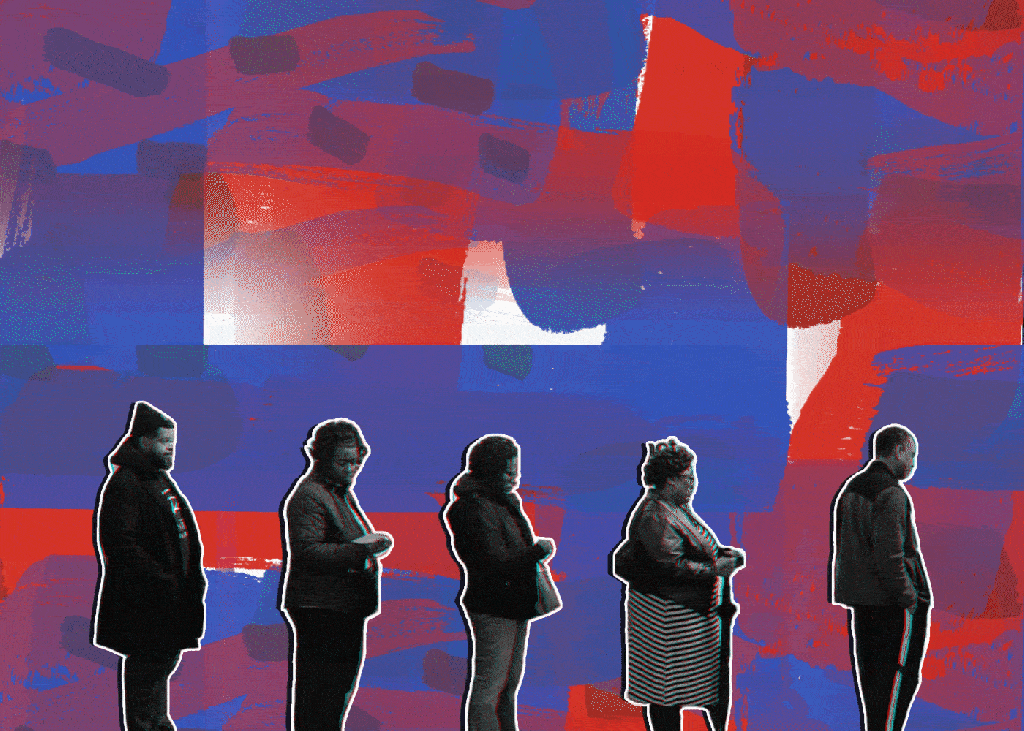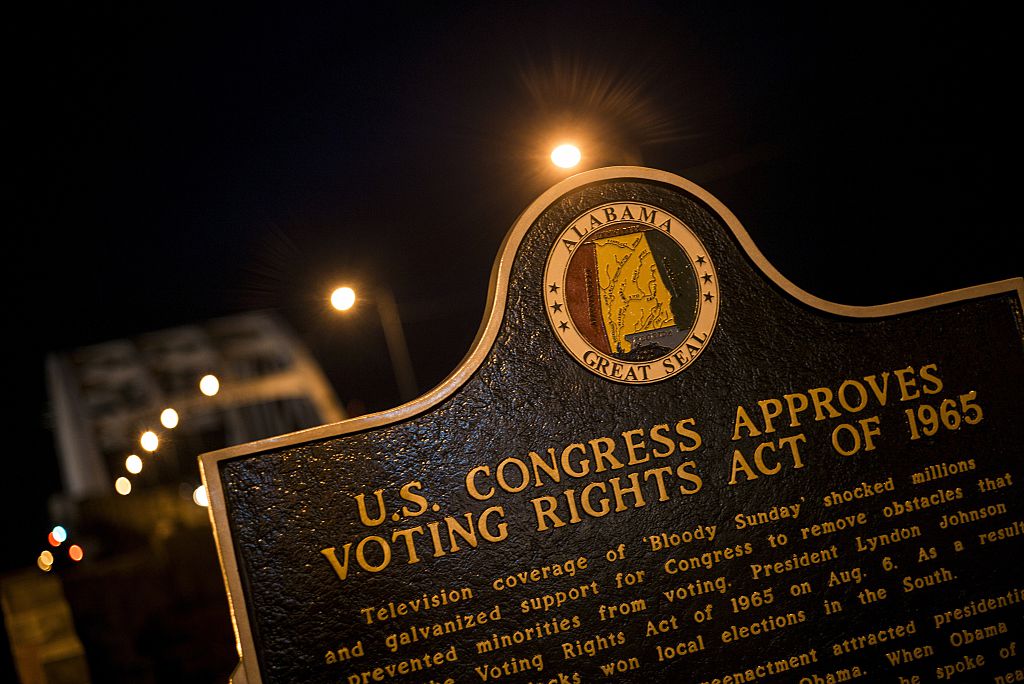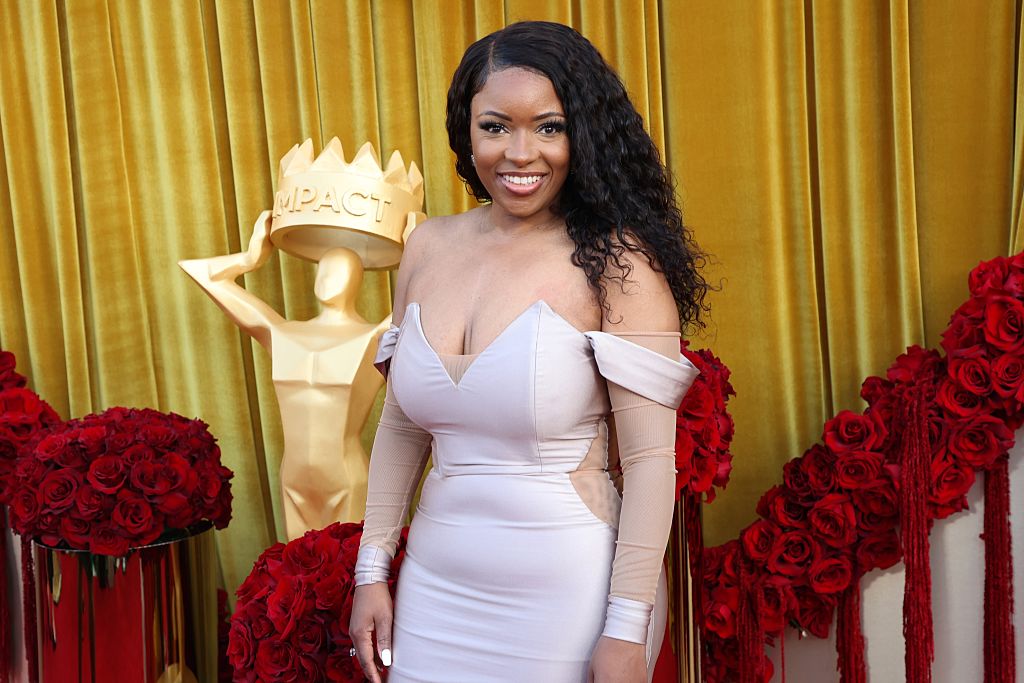2022 Election Day Live Updates: Tracking Black Voters, Candidates
Election Day Live Updates: Tracking Black Candidates And Voters In 2022 Midterms

Source: Creative Services / iOne Digital
This article will be regularly updated with additional information including election results as it becomes available.
UPDATED: 12:30 a.m. ET, Nov. 9
Stacey Abrams has conceded to Georgia Gov. Brian Kemp in their governor rematch race in Georgia four years after she met the same fate, according to a report from the New York Times.
Video footage of Abrams telling a campaign audience that she “may have come up short” was also posted to social media as the Associated Press still had not called the race after midnight.
CNN and NBC News also projected Kemp to be the winner of the race.
UPDATED: 9:34 p.m. ET
The Legal Defense Fund issued a statement condemning what it called voter suppression targeting Black voters on Election Day.
“In the face of countless barriers, Black voters and other voters of color once again showed their unwavering commitment to exercising their right to vote in this critical election season,” Janai Nelson, President and Director-Counsel of the LDF, said in a statement emailed to NewsOne. “As votes continue to be processed and counted over the next several days and voters’ voices are heard, we must once again note the failings of the American electoral system to ensure that all voters can cast a ballot and have that ballot counted free from attempts to suppress their votes.”
UPDATED: 9:24 p.m. ET
Georgia Democratic Congresswoman Lucy McBath has won re-election to return to the U.S. House, the Associated Press projected.
McBath was forced to run in a different Congressional district after Republicans redrew district lines to put her in a district in which democrats were unlikely to win. Just about a year ago, McBath announced she would not be seeking re-election in Georgia’s 6th Congressional District and instead would run in the 7th District.
McBath was elected in the years following the tragic murder of her 17-year-old son, Jordan Davis, who was shot in 2012 by a white man who said he felt “threatened” by the volume of the music being played in the car in which the teenager was a passenger.
UPDATED: 9:18 p.m. ET
Upstart Congressional candidate Marcus Flowers has lost his bid to upset incumbent and insurrectionist-sympathizing Georgia Rep. Marjorie Taylor Greene, according to the Associated Press.
UPDATED: 9:04 p.m. ET
North Carolina Democratic U.S. Rep. Alma Adams has won her re-election to the U.S. House. Adams, a prominent member of the Congressional Black Caucus, soundly defeated her Republican opponent with a projection of more than double the support of voters.
UPDATED: 9:00 p.m. ET
Democratic Congresswoman Lisa Blunt Rochester has won re-election to serve her fourth term in the U.S. House representing Delaware. Rochester Delaware’s only Congressperson.
UPDATED: 8:57 p.m.
Democratic Lt. Gov. Juliana Stratton has won re-election in Illinois in a victory that was celebrated in part by EMILY’s List, a nonprofit organization promoting women political candidates.
“EMILY’s List celebrates Illinois Lt. Gov. Juliana Stratton’s reelection,” EMILY’s List President Laphonza Butler said in a statement emailed to NewsOne. “We’re proud to have stood with her in this important race, and we know that she will continue fighting to ensure that Illinois remains an abortion safe haven amid nationwide attacks on our reproductive freedom. Lt. Gov. Stratton will tirelessly advocate for a brighter future for every person in the Prairie State.”
Stratton is the first Black lieutenant governor in Illinois history.
UPDATED: 8:52 p.m. ET
Democrat Andre Carson is projected to win his re-election to represent Indiana’s 7th Congressional District in the U.S. House.
UPDATED: 8:48 p.m. ET
Democrat Chris Jones fell short in his bid to be Arkansas governor after the Associated Press called the race in favor of Sarah Huckabee Sanders, the former White House press secretary for former President Donald Trump.
UPDATED: 8:41: p.m. ET
Democrat David Scott of Georgia has won his re-election to the U.S. House, the Associated Press projects.
UPDATED: 8:35 p.m. ET
Republican Florida U.S. Rep. Byron Donalds has won his bid for reelection, giving Republicans 17 of the Sunshine State’s 28 House seats with only six races left to call.
UPDATED: 8:25 p.m. ET
Democrats have been making gains in the U.S. House as a pair of Black candidates have been projected to win their Congressional races Tuesday night.
State Rep. Jasmine Crockett has won her election to represent the U.S. House in Texas’ 30th Congressional District and upstart candidate Maxwell Frost clobbered his Republican counterpart to win the Florida U.S. House seat that was vacated by Val Demings, who lost her U.S. Senate race Tuesday night to Sen. Marco Rubio.
Frost, 25, is being recognized as Gen Z’s first member of Congress.
UPDATED: 8:20 p.m. ET
Upstart political candidate Wes Moore made history Tuesday night after he was elected governor of Maryland in a likely landslide victory over Republican nominee Dan Cox.
The victory made Black history as Moore now becomes the first Black governor of Mayland and just the third-ever Black person elected governor in U.S. history.
UPDATED: 8:10 p.m. ET
U.S. Rep Val Demings has lost her bid to become a U.S. Senator in Florida after falling short to Republican incumbent Sen. Marco Rubio on Tuesday.
NBC News projected the victory for Rubio and the Political Polls website reported that Demings lost by a margin of seven percentage points.
UPDATED: 8:00 p.m. ET
Kentucky Republican U.S. Sen. Rand Paul has defeated Charles Booker in a political contest that increasingly took on a racial tone. The Associated Press called the race in favor of Paul, who advances to his third term in the U.S. Senate.
Booker was the first Black person to be Kentucky’s Democratic nominee for U.S. Senate.
UPDATED: 7:10 p.m. ET
Incumbent Republican Sen. Tim Scott has won re-election in South Carolina, according to a report from the Associated Press. Scott emerged victorious over State Rep. Krystle Matthews, a Black woman.
UPDATED: 6:15 p.m. ET
Exit polling data reported by Reuters has begun to trickle in as polling places begin to close for the day along the east coast.
While the responses to a number of questions about this voting cycle did not fall along racial or partisan lines, they still provided insight into how voters were prioritizing a number of key issues on the ballot this year.
In particular, few voters said listed their top concerns as crime and immigration, two topics that Republicans have repeatedly tried to fearmonger with by disingenuously scapegoating Democrats as being weak on crime.
On the flip side, about 80% of the respondents identified the economy as being “not so good or poor” and about 60% signaled their opposition to the overturning of the landmark abortion case Roe v. Wade.
Notably, about 60% of respondents said they thought democracy was under attack, a common refrain among Black voters, in particular, who have had to withstand efforts at disenfranchisement on a number of levels.
Voters explained their motivations for voting in this year’s elections
UPDATED: 2:15 p.m. ET
Amid concerns about voter intimidation, Florida Gov. Ron DeSantis is trying to block federal election monitors dispatched by the Department of Justice at several polling places in the Sunshine State.
“Department of Justice monitors are not permitted inside a polling place under Florida law,” said a letter written by Brad McVay, the general counsel for the Florida Department of State, and sent to John Russ, the DOJ’s deputy chief and elections coordinator. The letter added later: “the presence of federal law enforcement inside polling places would be counterproductive and could potentially undermine confidence in the election.”
The letter from Florida came as the NAACP and other civil rights groups sounded the alarm over voter intimidation concerns.
UPDATED: 1 p.m. ET
The trend of Black voters in Georgia showing out to the polls in force during the early voting period appeared to be extending into the general election, according to a new report. However, the rate of Black voters casting ballots on Tuesday was much lower than during the early voting period when Black voters fueled an overall record turnout for the early voting period.
Twenty-one percent of Georgians casting their votes as of about 12 noon on Tuesday have been Black, Capital B political reporter Chauncey L. Alcorn tweeted.
In comparison, Black voters accounted for 39% of all voters on Oct. 14, the first day of the early voting period in Georgia.
In Pennsylvania, State Rep. and congressional candidate Summer Lee spoke to the media on Election Day. In 2018, Lee made history after she became the first Black woman to be elected to Pennsylvania’s legislature, winning over 67 percent of the vote.
UPDATED 12 p.m. ET
Social media reports out of Maricopa County in Arizona indicate that there are faulty voting machines not working properly.
The number of Black people in Maricopa County is relatively low, according to Census data. However, 32% of the county’s nearly 4.5 million population identifies as Hispanic or Latino, groups that are similarly targeted with voter suppression tactics not unlike broken voting machines — an approach that Brian Kemp allegedly employed when he won the 2018 gubernatorial election over Stacey Abrams.
https://twitter.com/MadisonMcClean/status/1590016757229826048?s=20&t=pdy8-gXcogr-PDC8cxmWVg
UPDATED: 11 a.m. ET
Amid widespread predictions that Republicans will make significant gains on Election Day, there’s a new report suggesting that Black voters are bracing for the blame that they feel will inevitably be assigned to them as Democrats lick their wounds, according to the Hill.
But if there is any blame to assign, it likely won’t fall on the shoulders of Black voters if history and early voting data are any indications.
“In every election since 2016, Black voters have shown up in record and historic numbers,” Adrianne Shropshire, executive director of BlackPAC, told the Hill. “I don’t think that this midterm is going to be any different, and we’ve seen the result of early voting in critical states around the country, and those early vote numbers include Black voters.”
UPDATED: 10 a.m. ET
Civil rights leaders were renewing their calls to encourage voters to turn out at the ballot box on Tuesday.
“As our democracy hangs in the balance – this election is too important to ignore,” NAACP CEO & President Derrick Johnson said in a statement emailed to NewsOne. “For anyone who has not voted yet – this is the final day to get out and make sure your voice is heard. Voting is power and in this election, it is imperative that we utilize our collective power to stand up to extremism and injustice.”
Johnson’s statement came hours after the NAACP filed a last-second lawsuit in Texas accusing local election officials of intimidating Black voters.
“White poll workers throughout early voting repeatedly asked in aggressive tones only Black voters and not white voters to recite, out loud within the earshot of other voters, poll workers, and poll watchers, their addresses, even when the voter was already checked in by a poll worker,” the suit centered on the city of Beaumont in Jefferson said in part, the New York Times reported.
Original story:
A number of polling places on the East Coast had opened by 7 a.m. on Tuesday as voters who didn’t participate in early voting look to cast their ballots in midterm elections with plenty at stake regardless of political affiliation.
However, with that said, Black voters and candidates arguably have the most to gain – and lose – depending on results in key races that range from governor’s seats to the U.S. Senate to the U.S. House to mayors and other contests further down ballots.
Notably, Stacey Abrams has been waging a strong gubernatorial campaign in Georgia in a second consecutive run against Brian Kemp. Also in Georgia, Sen. Rev. Raphael Warnock has been engaged in a tight race against football star-turned-candidate Herschel Walker, whose campaign has been steadily pelted by repeated bombshell revelations that do not seem to have affected his candidacy.
It is also in Georgia where Black voters fueled a record number of early voting in what could be an indication of what’s to come from Democrats’ most loyal voting bloc as Republicans attempt to win back the House and Senate.
Elsewhere, Wes Moore is poised to be just the third Black person ever elected governor if he wins his race in Maryland, where polling suggests a landslide victory is on the horizon. Moore, Abrams and Deidre DeJear in Iowa are the only Black gubernatorial nominees this year.
In Wisconsin, Lt. Gov. Mandela Barnes is seeking to beat incumbent Republican Sen. Ron Johnson in a race that’s been marked by racist dog whistles against the younger Democrat.
Other notable Black candidates include U.S. Rep. Val Demings, the Democratic nominee for U.S. Senate running against Republican Sen. Marco Rubio; Kentucky Attorney General Daniel Cameron, who was famously blamed for not charging police officers for Breonna Taylor’s killing, is running for governor; Keith Ellison, Minnesota’s attorney general whose office secured the conviction of Derek Chauvin for murdering George Floyd, is up for re-election; and California U.S. Rep. Karen Bass is running for mayor in Los Angeles.
A number of notable issues of particular interest to Black voters are on ballots across the country, including but not limited to slavery, education and reproductive justice.
Other issues Black voters should be aware of that are not on the ballot but can certainly affect their ability to cast them include misinformation campaigns and other efforts that aim to disenfranchise Black voters.
There’s also the issue of election challenges, which arise when any registered voter challenges the right of another voter, or group of voters, to cast a ballot by alleging that they are not qualified to do so. Experts say such challenges have an outsized effect on Black voters stemming from overall voter suppression efforts.
It is for those above and plenty of other reasons that voting activists, organizers and advocates have been working overtime to increase election awareness for Black voters in particular who already must contend with a series of new election laws that critics say make it harder to vote.
But voter suppression is nothing new and if 2020 is any indication of the type of voting power we can expect from Black people at the polls this year, Democrats can expect to be saved yet again by the influential but often overlooked demographic.
This is America.
SEE ALSO:
Black Georgia Democrat Who Lost Lieutenant Governor Race Endorses Republican Ticket
New York Times List Of Black Senator Candidates Excludes Two From Louisiana


















